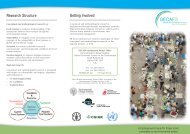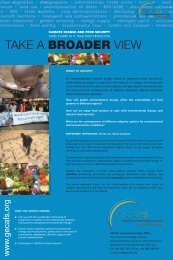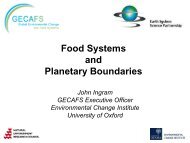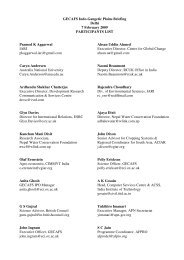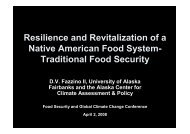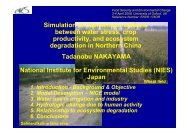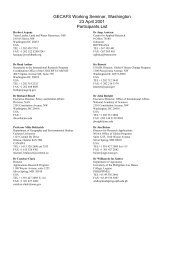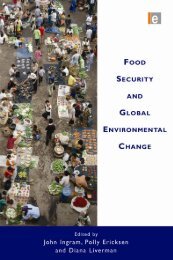From Food Production to Food Security - Global Environmental ...
From Food Production to Food Security - Global Environmental ...
From Food Production to Food Security - Global Environmental ...
- No tags were found...
You also want an ePaper? Increase the reach of your titles
YUMPU automatically turns print PDFs into web optimized ePapers that Google loves.
Agronomic research in relation <strong>to</strong> food security policy<strong>Food</strong> security is the state when ‘all people, at all times, have physical and economic access <strong>to</strong>sufficient, safe, and nutritious food <strong>to</strong> meet their dietary needs and food preferences foran active and healthy life’ (FAO, 1996a). So, while production is clearly a critical elementcontributing <strong>to</strong> food security, other fac<strong>to</strong>rs dealing with access <strong>to</strong> food and food utilisation arealso important (Ericksen, 2008a); <strong>to</strong>o often discussions on food security policy appear <strong>to</strong> bebased on a relatively narrow agronomic perspective because the links between climate changeand the broader issues related <strong>to</strong> food security have, <strong>to</strong> date, been relatively unexplored(Gregory et al., 2005). There is therefore a fourth important role for agronomy, namely <strong>to</strong>couple research on impacts and adaptation more effectively <strong>to</strong> food security policy,particularly given the increasing prominence of the agriculture/biofuels debate. To overcomethe limitation of current agronomic research outputs in this arena there are several scientificchallenges where further agronomic effort is necessary. As food security is underpinned by aneffective food system, setting food production research within the context of food systemsprovides a promising way forward. ‘<strong>Food</strong> systems’ are a set of dynamic interactions betweenand within the biogeophysical and human environments. They include a number ofactivities (producing food; processing, packaging and distributing food; and retailing andconsuming food) which lead <strong>to</strong> a number of associated outcomes some which contribute <strong>to</strong> foodsecurity (i.e. food availability, access <strong>to</strong> food and food utilisation), and others which relate <strong>to</strong>environmental and other social welfare concerns (Ericksen, 2008a). While agronomicresearch clearly has a leading role in activities relating <strong>to</strong> producing food, there is also a need<strong>to</strong> consider agronomic input <strong>to</strong> other aspects of the food system. Examples include foodquality (in relation <strong>to</strong>, e.g. s<strong>to</strong>rage and processing characteristics), timing of production(in relation <strong>to</strong>, e.g. market opportunities) and diversity (in relation <strong>to</strong>, e.g. nutritionalbalance). As food security is diminished when food systems are disrupted or stressed, foodsecurity policy needs <strong>to</strong> address the whole food system. To this end, agronomic researchneeds <strong>to</strong> be better linked <strong>to</strong> wide-ranging interdisciplinary studies (e.g. vulnerability of foodsystems; Figure 4, right hand column) and across sec<strong>to</strong>rs of the food industry. This willfacilitate the building of integrated socioeconomic-biophysical models that will enableanalysis of adaptation options <strong>to</strong> food systems, thereby underpinning policy formulationfor improved food security.This raises another major challenge, namely understanding how best <strong>to</strong> address theinformation needs of policy makers and report and communicate agronomic research results ina manner that will assist the development of food systems adapted <strong>to</strong> climate change. To beof use in supporting policy formulation, research on the development and assessment ofpossible strategies <strong>to</strong> adapt food systems <strong>to</strong> the impacts of climate change should be elaboratedin the context of the policy process. As the food security–climate change debate encompassesmany complex and interactive issues, a structured dialogue is needed <strong>to</strong> assist thecollaboration among scientists and policymakers.32



